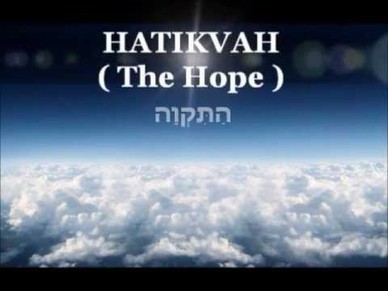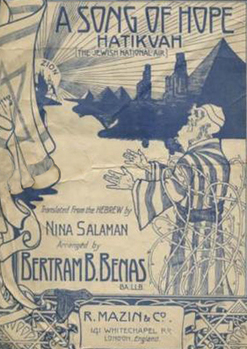Hatikvah
|
Hatikvah is the anthem of Israel since many years. The history of the lyrics and the melody is complex and, depending on the source, told in many different ways.
The lyrics were adapted from the nine-stanza poem "Tikvateynu" (Our hope), written in 1877 by the poet Naphtali Herz Imber (1856 - 1909), from Galicia. He wrote the poem as one of the first Jewish settlements, Petah Tikvah, was established in Ottoman Palestine. In 1886 Imber published his first book with poems entitled "Morning Star" (Barkai), which included "Tikvateynu". This passionate poem touched the hearts of the Jewish people and it was adopted as the anthem of "Hovevei Zion" (lovers of Zion) and later, in 1897, of the Zionist Movement. The melody dates back to the 17th century and its roots are Italian. |
Composer Giuseppino Del Biado is credited with the tune in his song "La Mantovana", which starts "Fuggi, fuggi, fuggi dal questo cielo" (flee, flee, flee from this sky) This song appeared in print in his 1600 collection of madrigals. In Italy the song was known as "Ballo di Montova". The haunting melody spread throughout Europe and was known under various titles, such as:
- Pod Krakowem, a Polish folk song
- Kateryna Kucheryava, Ukrainian
- Virgen de la Cueva, Spain
- It was the basis for the composer Smetana's symphonic poem celebrating Bohemia, "Ma Vlast"
|
Samuel Cohen is credited with the adaption in 1888 of the melody we now know of as Hatikvah. But there have been some disputes about this, about the lyrics and about the music. Samuel Cohen claimed the music was based on the Romanian folk song he heard as a child. Anyhow, each of the musical derivates, including Hatikvah, shares many structural similarities to "La Mantovana".
The current version of Hatikvah incorporates only the first stanza from the original poem. The remaining stanzas focus on the establishment of a sovereign Israeli nation. For the Jews Hatikvah became a song to be sung in times of joy and in times of horror. Also worth to know about Hatikvah: The British Mandate government briefly banned its performance in 1919, due to Arab anti-Zionist political activity. In 1944, Czech Jews spontaneously sang it at the entry of the Auschwitz-Birkenau gas chamber In 1948 Hatikvah was unofficially proclaimed the national anthem, in 2004, this was made officially. |
Over centuries the adaptions of the words of hope have endured. The harmony of Hatikvah, in minor key, which is unusual for an anthem, sounds mournful. The title "The hope" suggests the lyrics are optimistic and uplifting. In spite this controversy, Hatikvah has the power to speak to the human soul.
Sources: http://www.aish.com/j/as/The_History_of_Hatikvah.html;
http://en.wikipedia.org/wiki/Hatikvah
Click the link to hear Hatikvah on accordeon
Sources: http://www.aish.com/j/as/The_History_of_Hatikvah.html;
http://en.wikipedia.org/wiki/Hatikvah
Click the link to hear Hatikvah on accordeon


